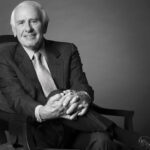Jim Rohn was broke at 25 and a millionaire by 31. How does an Idaho farm boy make it to Beverly Hills? This is how…
At 25, there was nothing in my bank and I needed to provide for my family. As I was considering what to do, I met John Earl Shoaff, a wealthy entrepreneur who became my employer for the next five years. He revolutionized my life and taught me the importance of developing my personal philosophy, to look for those few things that make the most difference and to spend most of my time doing those things. It isn’t a complex or mystical process but a principle that can make a difference in how your life turns out.
While there are many puzzle pieces for success, without developing a sound philosophy, the other pieces are of little value. So as you go forward on this journey toward success, remember to:
1. Set your sail.
The winds of circumstance blow upon all of us. We all have experienced the winds of disappointment, despair and heartbreak, but why do people arrive at such different places at the end of the journey? Have we not all sailed upon the same sea?
The major difference isn’t circumstance; it’s the set of the sail, or the way we think—it’s what we do after we’ve set our sails and the wind decides to change direction. When the winds change, we must change. We have to struggle to our feet and reset the sail in a manner that will steer us in the direction of our own deliberate choice. The set of the sail, or how we think and how we respond, has a far greater capacity to destroy our lives than any challenges we face. How quickly we respond to adversity is far more important than adversity itself.
The great challenge of life is to control the process of our own thinking.
2. Learn from success and failure.
The best way to establish a new and powerful personal philosophy is to objectively review the conclusions you’ve drawn about life. Any conclusion you’ve drawn that isn’t working for you could be working against you. The best way to counteract misinformation and wrong data is to input new and accurate information. Gather information from personal experience. If you’re doing something wrong, evaluate what you did wrong and change things.
Seek an objective, outside voice about how you are and what you’re doing. An objective opinion from someone you respect can lead you to early and accurate information about your decision-making process. Listen to the freshness of an outside voice—someone who can see the forest and isn’t lost in the trees.
Observe the successes and failures of other people. If people who failed were to give seminars, it would be helpful. You could see how people mess up and you wouldn’t do what they did. Past failures and errors prompt us to amend current conduct so we don’t replicate the past.
Study from people who do well. Each of us should be in a constant search for people we admire and respect and whose behavior we can model. It’s far better to deliberately choose the people we will permit to influence us than to allow bad influences to affect us without our conscious choice.
3. Read all you can.
People from all walks of life who’ve had some of the most incredible experiences have taken the time to write of these experiences so we can be instructed and amend our philosophies.
The contributions of other people enable us to reset our sails based upon their experiences. Books offer treasures of information that can change our lives, fortunes, relationships, health and careers for the better.
There are two books you need to read to build your philosophy: Think and Grow Rich by Napoleon Hill and The Richest Man in Babylon by George S. Clason.
4. Keep a journal.
A journal is a gathering place for all of our observations and discoveries about life. It’s our own handwritten transcript that captures our experiences, ideas, desires and conclusions about the people and the events that have touched our lives. The past, when properly documented, is one of the best guides for making good decisions.
The very act of writing about our lives helps us think more objectively about our actions. Writing tends to slow down the flow of information and gives us time to analyze and ponder the experience. The intense scrutiny of journal writing can enable us to make refinements in our philosophy that are truly life-changing.
Jot down what you learn and be a buyer of empty books. It’s the small disciplines that lead to great accomplishments.
5. Observe and listen.
Pay attention during your day, watch what’s going on. Surround yourself with people you respect and admire. Find people whose personalities and achievements stimulate, fascinate and inspire you, and then strive to assimilate their best qualities. This is called the skill of selecting. Don’t waste your time on the silly and the shallow.
One of the major reasons people don’t do well is because they keep trying to get through the day while a more worthy cause is to get from the day. We must become sensitive enough to observe and ponder what is happening around us. Be alert. Be awake. Often the most extraordinary opportunities are hidden among seemingly insignificant events.
Be a good listener. Find a voice of value and stay for a while. With so many voices vying for your attention, you need to develop the skill of selective listening and only dial into the radio station that appeals to you. If a voice is not leading to the achievement of your goals, exercise caution in how long you listen.
6. Be disciplined.
Every day is filled with dozens of personal crossroads, moments when we’re called upon to make a decision regarding minor as well as major questions. These decisions chart a path to a future destination. With careful mental preparation, we can make wise choices.
The development of a sound philosophy prepares us for making sound decisions. When we eat healthy foods, we experience positive results in a short time. When we start exercising, we feel a new vitality almost immediately. When we begin reading, we experience a growing awareness and a new level of self-confidence.
New disciplines practiced daily will produce exciting results. The magic of new disciplines causes us to amend our thinking.
7. Don’t neglect.
Neglect is the major reason people don’t have what they want. If you don’t take care of things in your life, neglect becomes a disease. If you neglect to do good things with your money, you probably neglect to do good things with your time. If you don’t know what’s going on with your health or your bank account, you could be at risk.
Set up new disciplines to change your life. Don’t neglect. Everything is within our reach if we will read books, use journals, practice the disciplines and wage a new and vigorous battle against neglect.
Build your philosophy. Commit yourself to a new journey and say, I’m going to change my life. Once you do, you’ll never look back.
Photo by Tim Bogdanov on Unsplash
This article originally appeared on JimRohn.com and has been republished with permission.










